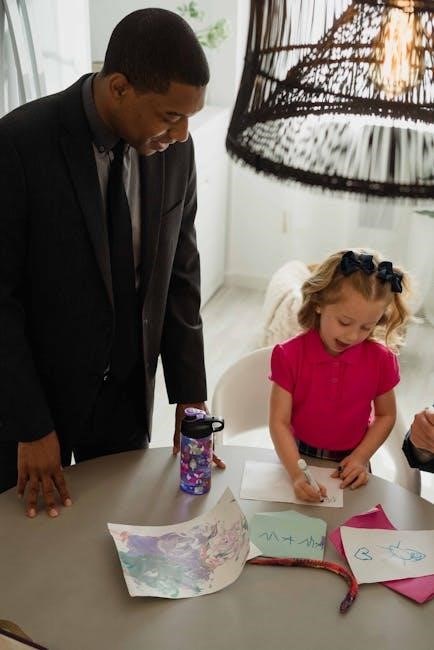Infidelity profoundly affects family dynamics, causing emotional turmoil and trust issues. It challenges parent-child relationships, requiring empathetic guidance to navigate healing and rebuild connections.
1.1 Defining Infidelity and Its Variations
Infidelity refers to acts that breach trust within a relationship, often involving emotional or physical connections outside the partnership. It can manifest as emotional infidelity, where intimacy is shared with someone else, or financial infidelity, involving secretive monetary decisions. Digital infidelity encompasses secretive online interactions, blurring boundaries between friendship and betrayal. Understanding these forms helps parents address specific challenges and guide their families through healing and rebuilding trust.
1.2 The Emotional Aftermath for Parents and Children
Infidelity leaves parents grappling with shock, guilt, and sadness, while children often struggle with trust issues and emotional distance. The betrayal can create a ripple effect, leading to feelings of insecurity and confusion. Parents may experience intense emotional turmoil, making it challenging to maintain stability for their children. Meanwhile, children might internalize the conflict, leading to long-term emotional challenges. Understanding and addressing these emotional wounds is crucial for guiding the family toward healing and rebuilding trust.

The Emotional Impact of Infidelity on Parents
Infidelity triggers intense emotions in parents, including shock, denial, anger, and profound sadness. These feelings can disrupt family harmony, making it challenging to guide children through the crisis.
2.1 Coping with Shock, Denial, and Anger
Shock, denial, and anger are natural reactions to infidelity, overwhelming parents emotionally. Acknowledging these feelings is crucial for healing. Seeking support from loved ones or professionals can provide guidance. Managing anger constructively helps prevent further family damage, fostering a healthier environment for children. Understanding these emotions aids in navigating the crisis effectively and supports the family’s recovery journey.
2.2 Navigating Guilt, Shame, and Sadness
Guilt, shame, and sadness often follow infidelity, complicating emotional recovery. Parents may grapple with self-blame or sorrow, impacting their ability to support their children. Acknowledging these emotions is vital for healing. Practicing self-compassion and seeking professional help can alleviate these feelings. Open communication with loved ones fosters understanding and strengthens family bonds, aiding in the journey toward emotional recovery and rebuilding trust.
Effects of Infidelity on Parent-Child Relationships
Infidelity strains parent-child relationships, often leading to trust issues and emotional distance. Protecting and guiding children through the crisis is crucial for their well-being and future relationships.
3.1 Trust Issues and Emotional Distance
Infidelity often erodes trust in parent-child relationships, leading to emotional distance. Children may struggle with feelings of betrayal, questioning their parents’ reliability. This can manifest as withdrawal or rebellion. Parents must address these issues with honesty and empathy, reassuring their children of unwavering support. Open communication and consistent behavior are key to rebuilding trust and bridging the emotional gap. It’s essential to create a safe space for children to express their feelings and understand the situation without blame.
3.2 Protecting and Guiding Children Through the Crisis
Guiding children through infidelity requires sensitivity and care. Parents should ensure their children’s emotional well-being by maintaining stability and honesty. Establishing clear boundaries and protection rules helps shield them from unnecessary details. Open, age-appropriate conversations can address their concerns without overwhelming them. Consistency in routines and reassurance of love provide a sense of security. It’s crucial to avoid blaming or involving children in conflicts, allowing them to process emotions safely while fostering resilience and trust.
Communication Strategies for Parents
Open dialogue, honesty, and emotional boundaries are key. Parents should reassure children of their love and safety, fostering trust while addressing concerns sensitively.
4.1 How to Talk to Your Children About Infidelity
Talking to children about infidelity requires sensitivity and honesty. Be age-appropriate, reassuring them of your love and support. Acknowledge their feelings without assigning blame. Use simple language to explain changes in the family, while protecting their emotional well-being. Encourage open questions and provide comfort, ensuring they feel safe and valued. This approach helps them process the situation healthily and maintain trust in you.
4.2 Setting Boundaries and Protection Rules
Establishing clear boundaries and protection rules is crucial to shield children from further emotional harm. Parents should enact guidelines on how infidelity is discussed within and outside the family. Ensure children are not exposed to adult conflicts or blamed for the situation. Implement privacy settings and age-appropriate restrictions on sharing sensitive information. Open communication channels should be maintained while safeguarding their emotional well-being. These measures help create a stable environment, fostering trust and security during a challenging time.
Healing and Rebuilding Trust
Healing from infidelity requires patience, therapy, and open communication. Parents must focus on self-reflection and rebuilding trust through consistent, honest actions that foster emotional healing and stability.
5.1 The Role of Therapy in Recovery
Therapy plays a crucial role in recovery by providing a safe space for parents to process emotions and rebuild trust. Professional guidance helps individuals and couples address underlying issues, fostering communication and understanding. Through structured sessions, therapy can aid in healing emotional wounds, promoting self-discovery, and strengthening relationships. It also equips parents with coping strategies to navigate the challenges of infidelity effectively, ensuring a healthier family dynamic.
5.2 Practical Steps to Rebuild Trust
Rebuilding trust requires consistent effort and transparency. Parents should engage in open, honest communication, admitting fault and taking responsibility. Setting clear boundaries and following through on commitments helps restore credibility. Encouraging empathy and mutual understanding fosters a supportive environment. Regular check-ins and shared goals can strengthen the relationship, while seeking professional guidance ensures accountability and progress. These steps, combined with patience, can gradually rebuild trust and create a foundation for healing and moving forward.

Co-Parenting After Infidelity
Co-parenting after infidelity requires prioritizing children’s well-being, maintaining respect, and fostering open communication. Setting clear boundaries and focusing on shared goals helps rebuild stability for the family.
6.1 Prioritizing Your Children’s Well-Being
Prioritizing your children’s well-being after infidelity involves shielding them from conflict and maintaining stability. Focus on open communication, reassurance, and emotional support. Ensure consistent routines and a safe environment to help them process their feelings without taking sides. Avoid involving children in adult issues and seek professional guidance if needed. By fostering trust and security, you can help them navigate this challenging time and promote long-term emotional resilience.
6.2 Managing Co-Parenting with an Ex-Partner
Co-parenting after infidelity requires creating a cooperative environment focused on your children’s needs. Minimize conflict by setting clear boundaries and communicating effectively. Avoid discussing the infidelity in front of your children and focus on shared goals for their well-being. Use “I” statements to express feelings without blame. Prioritize consistency in parenting styles and schedules. If tensions arise, consider mediation or counseling to maintain a healthy co-parenting relationship and ensure your children feel secure and loved.

Financial and Legal Considerations
Address financial infidelity and legal implications, ensuring asset protection and transparency. Consult professionals to navigate economic repercussions and secure your family’s financial stability post-infidelity.
7.1 Understanding Financial Infidelity
Financial infidelity occurs when one partner deceives the other about financial matters, such as hidden accounts, debts, or spending. It can erode trust and stability, affecting not only the marital relationship but also the entire family. This form of infidelity extends beyond romantic partners, potentially impacting relationships with children, siblings, or friends. Addressing financial infidelity requires transparency, accountability, and often professional guidance to rebuild trust and secure the family’s financial future.
7.2 Legal Implications and Protecting Assets
Infidelity can lead to significant legal consequences, particularly in divorce proceedings and custody battles. Protecting assets becomes crucial, as financial deception may affect property division. Consulting a legal advisor is essential to ensure fair distribution and safeguard family interests. Establishing clear boundaries and understanding rights can help mitigate potential conflicts. Prioritizing children’s well-being while addressing legal matters is vital for maintaining stability during this challenging time.

The Role of Media and Society
Media often sensationalizes infidelity, shaping public perception and influencing societal judgment; This scrutiny can amplify the emotional burden on families, complicating recovery and healing processes.
8.1 How Media Portrays Infidelity
Media often portrays infidelity as a dramatic or sensational event, frequently emphasizing its emotional intensity and consequences. This portrayal can influence societal views, making it seem either glamorous or devastating. Such depictions sometimes oversimplify complex family dynamics, reducing real-life struggles to mere plot points. Additionally, media coverage may inadvertently normalize infidelity or create unrealistic expectations about its resolution. This can affect how individuals and families perceive their own experiences, adding external pressure to an already delicate situation.
8.2 Navigating Societal Judgments and Stigmas
Societal judgments and stigmas surrounding infidelity can intensify the emotional burden on families. Many feel pressured to conceal the situation, fearing external criticism. Parents, in particular, may face unfair scrutiny, as societal expectations often hold them to higher standards. Navigating these challenges requires resilience and open communication. Families must balance the need for privacy with the importance of seeking support. Understanding that healing is a personal journey can help mitigate the impact of societal opinions and foster a more compassionate environment for recovery.

Personal Growth and Self-Reflection
Self-discovery and emotional healing are crucial for parents navigating infidelity. Reflecting on the experience fosters personal growth, helping to rebuild trust and strengthen family bonds over time.
9.1 Self-Discovery and Emotional Healing
Self-discovery and emotional healing are vital for parents after infidelity. Recognizing personal emotions and needs helps in rebuilding trust and fostering resilience. Through reflection, parents can identify patterns and triggers, gaining insights into their relationships. Emotional healing involves acknowledging pain, forgiving oneself, and embracing vulnerability. This journey strengthens self-awareness and paves the way for personal growth, enabling parents to create healthier family dynamics and relationships in the future.
9.2 Learning from the Experience
Learning from infidelity involves understanding its root causes and using the experience to foster personal and relational growth. Parents can identify patterns, improve communication, and establish healthier boundaries. This process helps in preventing future infidelity and strengthens family bonds. By embracing the lessons learned, individuals can develop resilience and create a foundation for trust and understanding, leading to more fulfilling relationships and a stronger family unit.

Preparing for the Future
Preparing for the future involves rebuilding trust and fostering resilience. Open communication, mutual respect, and a focus on shared goals help create a stronger, healthier family unit.
10.1 Preventing Future Infidelity
Preventing future infidelity requires open communication, trust, and mutual respect. Understanding each other’s needs and fostering emotional intimacy can help strengthen relationships. Setting clear boundaries and addressing issues before they escalate is essential. Seeking therapy or counseling can provide tools to navigate challenges and rebuild trust. Prioritizing quality time and maintaining transparency are key steps in creating a resilient and faithful partnership. Both partners must commit to growth and understanding to prevent recurrence.
10.2 Building a Stronger Family Unit
Rebuilding a stronger family unit after infidelity requires fostering open communication, empathy, and understanding. Creating a supportive environment where all members feel heard and valued is crucial. Encouraging shared activities and fostering trust helps heal emotional wounds. Setting clear boundaries and prioritizing quality time together strengthens bonds. Seeking professional guidance, such as therapy, can provide tools to navigate challenges. By focusing on shared values and creating positive experiences, families can move forward and build a resilient, loving foundation for the future.



